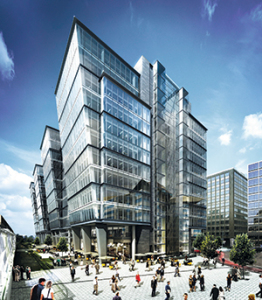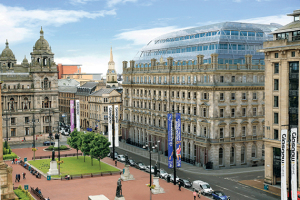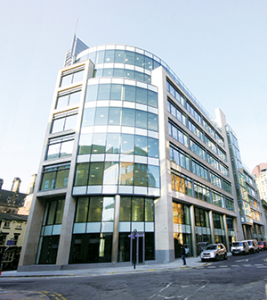 German investors, and in particular German open-ended funds, have been some of the largest and most sophisticated overseas buyers in the UK regions over the past two decades.
German investors, and in particular German open-ended funds, have been some of the largest and most sophisticated overseas buyers in the UK regions over the past two decades.
Funded by huge retail bank networks, through which the man on the street can opt to put aside as little as a few euros a month, the vehicles are part of the average German saver’s investment psyche and, as such, experience huge inflows and have enormous spending capacities.
The funds have relatively high return requirements considering they are conservative savings vehicles, which target prime assets with yields usually between 5% and 6%.
This typically means that, within the UK, they focus on buying in London at the bottom of a cycle, when it is possible to buy at the returns they require before quickly moving on to higher-yielding regional cities as the market recovers.
So what do two of the largest open-ended fund managers – Union Investment and Deka – think about the investment prospects offered by the UK’s
regional cities?
Union Investment
Hamburg-based Union Investment has more than €28bn (£20.5bn) under management. Of this, €1bn is in the UK and €340m outside London.
Union has, however, recently disposed of two large regional assets as part of its pan-European €1bn Aqua portfolio sale in August to Amundi Real Estate – the 220,000 sq ft Admiral building at 1 David Street in Cardiff and the 64,000 sq ft Equinox building at 19 Cadogan Street
in Glasgow.
According to Martin Brühl, Union’s head of international investment management and Cushman & Wakefield’s former head of Germany, the mature nature of the assets – fully let to Admiral and Esure respectively – mean that, given the strong appetite for investment in the UK, it was the right time to sell.
“The UK is a strong national market at present and in Glasgow and Cardiff you also have real strong regional markets. I don’t think it’s the end of yield compression but, sometimes three, four, five years into a cycle, it is a good idea to actually sell,” he says.
“It was the driver [of the Aqua sale] because the UK is the biggest commercial property market in Europe and it helped
us to put together an attractive multi-country portfolio.”
Despite the strong interest in UK- stabilised assets such as those sold within Aqua, Brühl still expects Union to be a net buyer rather than a net seller in the regions over the next year.
“We will be net buyers. We are not leaving the country, we were just selling out because we can make such a nice profit. We’ve actually had blows in the past few months [missing out on deals] because of tough competition,” he says.
Union invests only in offices in the UK. Brühl says you do not get a “proper return” for logistics compared with yields in Germany and central and eastern Europe and, while it has ambitions to buy a shopping centre in the UK, it has found the market too competitive.

Union’s largest UK regional asset is One Snowhill in Birmingham, which it bought at the end of 2013 for £125m from fellow German open-ended fund manager Commerz Real.
It has been trying to ply more cash into the city because of the prospect of the HS2 high-speed rail link, but missed out on buying the nearby Three Snowhill, which M&G agreed to forward purchase in June for more than £150m.
Union is looking at development projects because of the competitive nature of the current market. “We are looking at forward-funding because it’s slightly less competitive and you get slightly better yields,” says Brühl.
It has also been looking intensely for opportunities in Manchester but has missed out on several deals there too due to competitive pricing. It owns the Radisson SAS Manchester Airport Hotel but is eager to add more assets to its portfolio in the city.
“The Spinningfields area and the development around it are very interesting and so too is what happens around the town hall,” he adds.

Union’s other flagship asset in the UK regions is G1 – the 131,000 sq ft office building on Glasgow’s George Square,
which it bought in 2012 for £60m.
Brühl admits that last year’s referendum on whether Scotland would remain part of the UK made Union “think hard” about “responsibly investing third-party money into a region which could become a complete outlier in Europe if things go wrong”, and that devolution of extra power by the Conservatives since has “given us comfort”.
This year’s general election has given rise to the prospect of a UK exit from the European Union as the result of a referendum in 2017 under the new Conservative government.
Rather than be deterred, this is something that Brühl thinks may actually provide some opportunity in the UK for Union.
“I can’t imagine the UK is going to leave the European Union but the period of uncertainty that will precede the referendum is good for those who are bold, who are experienced and who have done their homework – and we’ve done it over 23 years,” he says.
Deka
Deka has invested in the UK market since 1994 and has made 82 purchases worth £7.2bn in total. It has £2.35bn of UK assets on its books, of which around 10% by value is in the UK regions.
It first stepped outside London in 1997 by buying the St Enoch shopping centre in Glasgow. It followed this two years later with Colmore Gate in Birmingham, its first office purchase. It sold that in 2006 for £80.5m – more than double its purchase price.
Matthias Danne, member of the management board at Deka, says that the UK regions have been a happy hunting ground since it entered the market but at present the fund manager believes the regions are just as competitive as the capital.
“I would say they are at least as hot as London. If you look at the figures, you see that all the city markets are peaking at the moment. It’s not as easy as saying, ‘Cap rates are 4.3% in London, let’s go up to Manchester or Birmingham’.”
For this reason, Deka has taken the opportunity to sell some of its stabilised regional assets. Last year it sold a 705,000 sq ft distribution centre in Waltham Abbey in Essex for £63m to Prologis, and Cambridge Retail Park for £109m to Standard Life.
“We still like the UK, and we would
like to keep the UK exposure in our funds. It’s just not easy at the moment [because of pricing]. We could sell everything, if we wanted to, but that’s not the plan,” he says.

Its largest regional UK assets are office buildings Belvedere in Manchester, 2 Temple Back East in Bristol and Edinburgh One, all of which it bought as the regional markets recovered post-downturn in 2011 and 2012.
Deka is no longer looking to buy logistics assets as they do not offer the same risk-adjusted returns as similar assets in eastern Europe. While Deka looks to buy retail assets, including prime high street units, Danne feels the market is too expensive.
In January last year it did manage to find an attractive deal in Edinburgh – purchasing a Radisson Blu hotel for £59m. Deka was attracted by its long lease with operator Rezidor until 2028 and its location in the city’s world heritage area.
“It could be this year and next year we are a net seller, but we want to keep our percentage of those assets the same. We have inflows of more than €1bn each year,
so we have to keep buying in the longer term,” says Danne.
In order to gain returns that match its requirements, Deka intends to move slightly up the risk curve.
Danne says: “We accept that there may be some things that should be asset managed in a property – for example, if there is a significant part of the rent role expiring within the next two or three years, say, or if you have to do some refurbishment work in a property. But what we are looking at is still always in core or core-plus locations.”
How the crash changed German open-ended funds
While German open-ended funds are still colossuses within the real estate investment world, the sector underwent a dramatic metamorphosis as a result of the financial crisis. This has determined which fund managers are most active in the UK regions and beyond.
By their very open-ended nature, the funds allow investors to request their cash back at any time. While in general terms the German open-ended funds sector itself did not underperform, other investments made by large institutions elsewhere that performed badly meant that they were short of cash and looked to withdraw from the funds to plug their own gaps.
As a result, mass redemption requests were made by lumpy institutional investors, which destabilised many funds that were, first and foremost, designed to provide steady returns to retail investors.
Most of these funds, run by the likes of SEB and KanAm, had to be closed for redemptions and liquidate their assets in order to pay back their investors.
Mixing retail investors and institutional investors proved disastrous and this is now something that is legally prohibited. Additional restrictions have also since been introduced, with investors now needing to notify fund managers of their intention to withdraw as long as a year before.
The chaos that ensued meant that only four titan open-ended fund managers remained – Union Investment, Deka, Commerz Real and Deutsche Bank’s fund management arm, Deutsche Asset & Wealth Management. This quartet now experience greater inflows because of the lack of competition, some of which they have to turn away because of a lack of suitable investment opportunities.
Their dominance means they are the most active German investors in the UK regions.











